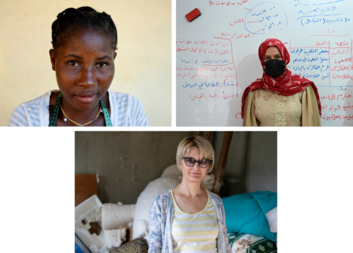This year, International Women's Day is about investing in women. Particularly in disadvantaged regions, women need support in the beginning to take their lives into their own hands. Laurinda, Rana and Tamar managed to start their own businesses despite obstacles, prejudice and poor economic conditions. Read the inspiring stories of these women who are now standing on their own two feet and providing for their families and communities thanks to the support of Caritas Czech Republic.
Laurinda sews colourful dresses in a refugee settlement in Zambia
It is a long way from the Mayukwayukwa refugee settlement to nearby towns and even further to job opportunities for the refugees living here. One of them is twenty-five-year-old Laurinda, originally from Angola, who found a safe haven in Zambia when she and her parents fled the war many years ago. However, there are few opportunities to earn money in the refugee settlement. The only option is often to set up her own business. Just like Laurinda did. Thanks to the support of Caritas Czech Republic, she attended a six-month course during which she trained as a seamstress. "Today, I have my own tailoring shop in the refugee settlement. I make dresses, shirts and school uniforms for the children," says Laurinda happily. As a single mother, she takes care of three children, and she is able to provide for them thanks to her own tailoring workshop.
Zambia is home to approximately 80,000 refugees who have fled violent conflicts, mostly from countries such as the Democratic Republic of Congo, Angola and Burundi. Although they are safe in Zambia, they find it difficult to find work to support themselves and their families. Caritas Czech Republic supports refugees like Laurinda to learn a trade and set up their own businesses. Thanks to our support, they are able to take their lives into their own hands and make a living in a new country.
Today, Laurinda has many satisfied customers who are happy to return to the skilled seamstress. "When I save enough money, I want to build my own workshop, so I don't have to rent the space. I would also like to build a bigger house for my children. Our current home is very small, and the children are growing and need more space," says Laurinda with a smile.
Rana runs an education centre in Iraq
In Iraq, scarred by years of conflicts, jobs are hard to find. Especially for women, who, particularly in conservative regions, are more likely to fill the traditional role of homemaker.But many Iraqi women are eager to start their own businesses. Like Rana, a graduate engineer who, thanks to Caritas Czech Republic, has opened her own training centre in the Anbar region, a former bastion of the self-proclaimed Islamic State. For years, Rana only tutored students in her home, but she dreamed of setting up her own education centre. Through perseverance and the support of Caritas Czech Republic, she finally succeeded.
"Caritas Czech Republic made it possible for me to fulfil my dream of having my own learning centre," Rana says gratefully. Thanks to a grant from Caritas Czech Republic, she acquired the necessary equipment for her centre, which now employs ten teachers and is attended by students from far and wide. "Their parents thank me for starting the centre and for allowing their children to be educated there. I respond by telling them to thank Caritas Czech Republic for making it possible," smiles Rana.
Tamar makes duvets in a disadvantaged region of Georgia
The Georgian region of Racha is nearly five hours away from the capital Tbilisi. But most locals choose the opposite route - they move from Racha to the Georgian capital for work. It is difficult to find work in the disadvantaged region. Tamar, who was born in Racha, does not intend to leave. Despite the obstacles, she decided to set up her own business and now makes duvets for customers in her hometown of Oni. Support from Caritas Czech Republic has enabled her to expand the business, which now employs other family members.
"In our workshop we process old duvets and make new ones. Customers bring us the old cotton and wool from their duvets, because the filling is still good quality, so people don't want to throw it away, but it needs to be gently cleaned, processed and put into new duvets. And that's what we do," Tamar says of her work. She has been processing duvets for 15 years and has no shortage of customers. "Our customers appreciate that we do quality work and recommend our services to other people," says Tamar happily.
Previously, Tamar used to process the duvet fillings on old machines from the Soviet era. The work therefore took a lot of time and she could not get as many customers as she needed.Thanks to a grant from Caritas Czech Republic, she managed to get new modern equipment. "Today we can process many more duvets, and I really appreciate the support from Caritas Czech Republic," Tamar says gratefully. She employs five people in her workshop, including her husband, father-in-law and mother-in-law.
The stories of Laurinda, Rana and Tamar prove that a little support at the beginning can make big things possible. Thanks to Caritas Czech Republic's help, these women have opened their own businesses and now not only support themselves, but also employ other people in regions where jobs are hard to find.
Supporting women to become self-sufficient is also possible thanks to the support of our donors. Join us in helping women like Laurinda, Rana, and Tamar take their lives into their own hands.













